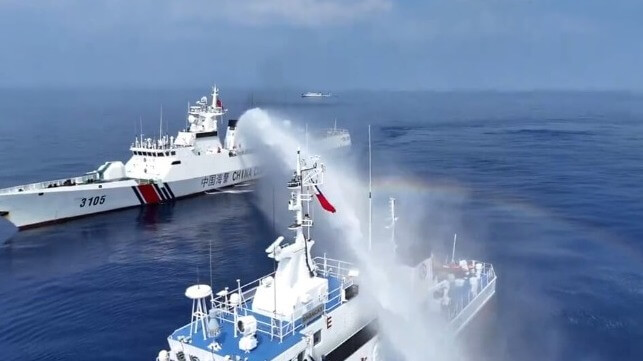China May Start Detaining Philippine Nationals in Philippine Waters
WWIII IN THE SOUTH CHINA SEA

The Chinese government is taking a step up with its attempt to control the western Philippine exclusive economic zone (EEZ). Last week, Beijing announced that the China Coast Guard would be empowered to arrest and hold anyone who tries to enter Chinese-claimed waters for up to 60 days, without trial.
The declaration is a response to Philippine attempts to reassert sovereignty over the Philippine sector of the South China Sea. Though Manila won an arbitral award in 2016 recognizing the legitimacy of its geographically-based EEZ, rejecting China's historically-based claims, Beijing continues to exert control over large swathes of the area through coercive measures. The China Coast Guard and the Chinese maritime militia are a constant presence near disputed features in the area, and Chinese forces have used water-cannons, aggressive maneuvering and manmade barriers in an attempt to deter Philippine navigation.
In a new 92-pae proclamation that takes effect in mid-June, the China Coast Guard said that it has the power to detain any foreigners who are suspected of crossing China's "borders" and hold them in custody for 30-60 days, without trial. The new enforcement procedures are the first to lay out a process for interdicting and detaining vessels that cross within China's sweeping maritime claims and are deemed to be "violating exit and entry management." The CCG's previous attempts at coercion have relied solely on deterrence and aggression, not boardings or detentions.
The measure follows shortly after a civilian protest convoy to Scarborough Shoal, a rich fishing ground off Luzon which China has occupied for more than a decade. The protest was partially successful in delivering supplies to a group of Philippine fishermen who were operating near the reef, but China Coast Guard patrol vessels drove off the fishermen and the primary group of vessels in the convoy departed without engaging in confrontation. Under the newly-announced rules, Chinese forces could have moved to intercept and arrest the protesters, even though Scarborough is within the Philippine EEZ.
“The domestic law they passed will not deter the PCG and [Armed Forces of the Philippines] in protecting the interests of Filipino people," Philippine Coast Guard spokesman Commodore Jay Tarriela told the Inquirer. "I don't think China is really serious in doing this because this would spark a backlash against them, and most likely, more countries will criticize and stand up against this kind of illegal domsetic law."
A longtime critic of China's behavior in Philippine waters, former Philippine Supreme Court judge Antonio Carpio, suggested that any attempt at detaining Philippine nationals in Philippine waters could be grounds for another international arbitral suit.
"The Philippines can bring the validity of the arrest and detention, of both fishermen and fishing vessel, before an UNCLOS tribunal, which can order their release," Carpio said, speaking to This Week in Asia
South China Sea Drama Unfolds
A Political Play?
A Filipino civilian convoy called “Atin Ito” claims to have breached China’s blockade around the Huangyan Dao, also known as Scarborough Shoal, in the South China Sea. The convoy reportedly aimed to resupply Filipino fishermen but stopped 50 nautical miles from the shoal. The Philippine Coast Guard and Navy monitored the mission. What are the real goals behind it? Are the fishermen being exploited, and are there other forces at play? Join us as we uncover the real story behind this high-stakes maritime drama.
No comments:
Post a Comment